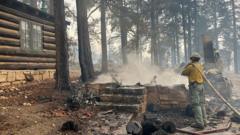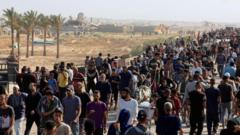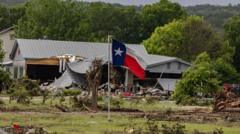The beginning of the wildfire season in Canada has marked a devastating chapter in Manitoba, where two individuals lost their lives in an uncontrolled fire that forced mass evacuations. Dense smoke and soaring temperatures are complicating efforts to manage the ongoing crisis.
Canada's Infamous Wildfire Season Begins with Fatalities in Manitoba

Canada's Infamous Wildfire Season Begins with Fatalities in Manitoba
Canada's wildfire season has officially kicked off, bringing with it tragic losses and record-breaking temperatures.
In a harrowing incident this past week, a raging wildfire near Lac-du-Bonnet, Manitoba, led to the tragic deaths of a man and a woman trapped by the flames. The police reported that the victims succumbed to the inferno before they could be reached by rescue teams sent to manage the emergency. This unfortunate event underscores a grim reality as Canada braces for another challenging wildfire season.
Acting as a somber beginning to what may be another record-breaking year, the deaths marked a stark contrast to Canada’s wildfire landscape in 2023, which saw a significant number of fires and the loss of eight firefighters, but none among the civilian population. "The news of this loss of life changes what was an emergency into a tragedy," remarked Manitoba's premier, Wab Kinew, during a press briefing.
The victims were located in Lac du Bonnet, a small town situated northeast of Winnipeg, under a mandatory evacuation order when the fire escalated. Although the identities of the deceased have not been disclosed, local officials have expressed shock at the rapid escalation of the wildfires. Mayor Ken Lodge commented, "People here, I think, are somewhat in shock over the ferocity of the fires and how quickly it all occurred."
Authorities reported that approximately 1,000 residents from the town and surrounding areas were evacuated due to the dire situation, as the fire grew to an alarming 10,000 acres. While the cause of the fire remains under investigation, surrounding regions have been grappling with an unprecedented heat wave, with temperatures in Winnipeg recently hitting 37 degrees Celsius, shattering a 125-year-old record.
Across several Canadian provinces, wildfires are reported to be burning, although many are currently under control. However, federal reports indicate that the dry and hot conditions are likely to exacerbate fire incidences as southern British Columbia and the prairie regions anticipate an uptick in lightning-caused fires.
Canada's wildfire season typically thrives from May to September, and while forecasts suggest a busy period ahead, comparisons to last year's events depict a potential disaster waiting to unfold. The previous year saw over 6,000 fires engulfing around 37 million acres — an area comparable to the size of England. Quebec's wildfires notably impacted the U.S., obscuring skies with smoke and resulting in serious health concerns due to poor air quality.
Currently, roughly 100 wildfires are active nationwide, a figure consistent with this time last year, according to the Canadian Interagency Forest Fire Centre. Additionally, five significant blazes remain out of control in Manitoba, though recent rainfall has provided some respite ahead of the much-anticipated holiday weekend.
"We're asking for rain," Premier Kinew shared, emphasizing the critical need for weather conditions to change as he implores citizens to remain safe during the celebrations planned in honor of Queen Victoria's birthday.
Acting as a somber beginning to what may be another record-breaking year, the deaths marked a stark contrast to Canada’s wildfire landscape in 2023, which saw a significant number of fires and the loss of eight firefighters, but none among the civilian population. "The news of this loss of life changes what was an emergency into a tragedy," remarked Manitoba's premier, Wab Kinew, during a press briefing.
The victims were located in Lac du Bonnet, a small town situated northeast of Winnipeg, under a mandatory evacuation order when the fire escalated. Although the identities of the deceased have not been disclosed, local officials have expressed shock at the rapid escalation of the wildfires. Mayor Ken Lodge commented, "People here, I think, are somewhat in shock over the ferocity of the fires and how quickly it all occurred."
Authorities reported that approximately 1,000 residents from the town and surrounding areas were evacuated due to the dire situation, as the fire grew to an alarming 10,000 acres. While the cause of the fire remains under investigation, surrounding regions have been grappling with an unprecedented heat wave, with temperatures in Winnipeg recently hitting 37 degrees Celsius, shattering a 125-year-old record.
Across several Canadian provinces, wildfires are reported to be burning, although many are currently under control. However, federal reports indicate that the dry and hot conditions are likely to exacerbate fire incidences as southern British Columbia and the prairie regions anticipate an uptick in lightning-caused fires.
Canada's wildfire season typically thrives from May to September, and while forecasts suggest a busy period ahead, comparisons to last year's events depict a potential disaster waiting to unfold. The previous year saw over 6,000 fires engulfing around 37 million acres — an area comparable to the size of England. Quebec's wildfires notably impacted the U.S., obscuring skies with smoke and resulting in serious health concerns due to poor air quality.
Currently, roughly 100 wildfires are active nationwide, a figure consistent with this time last year, according to the Canadian Interagency Forest Fire Centre. Additionally, five significant blazes remain out of control in Manitoba, though recent rainfall has provided some respite ahead of the much-anticipated holiday weekend.
"We're asking for rain," Premier Kinew shared, emphasizing the critical need for weather conditions to change as he implores citizens to remain safe during the celebrations planned in honor of Queen Victoria's birthday.


















